Know Your Bible Class 03
Chris Knepp

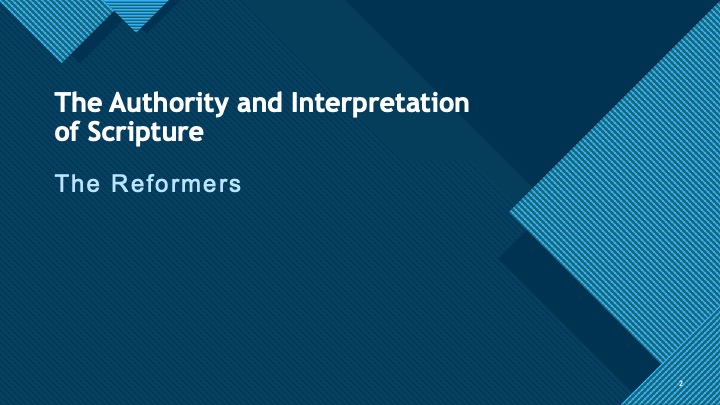
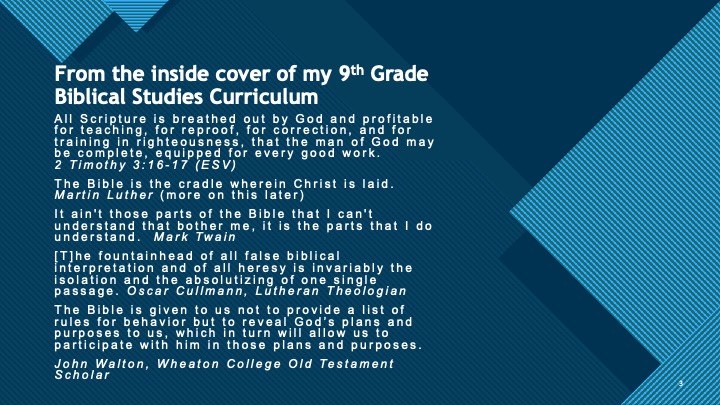
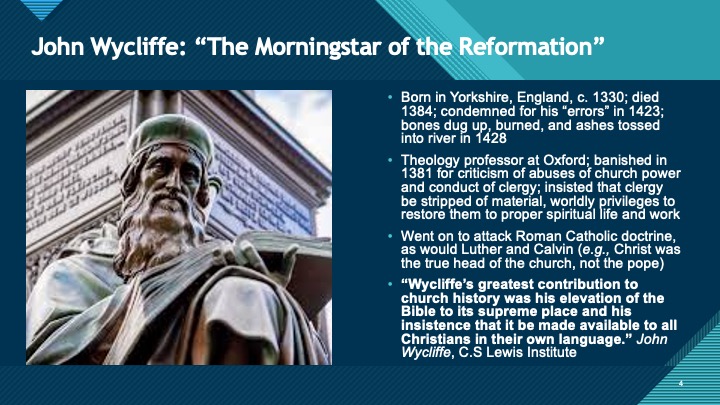
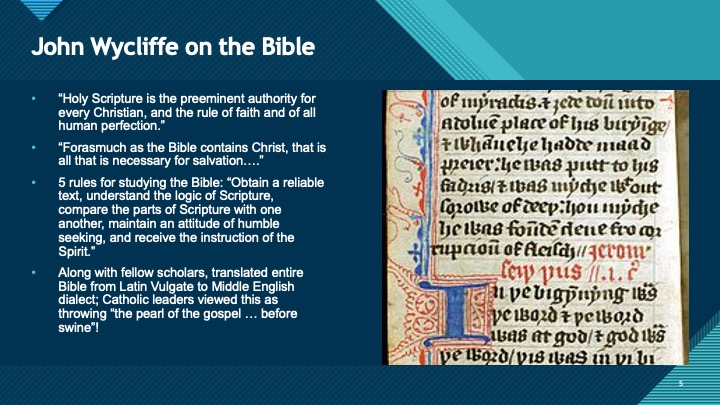
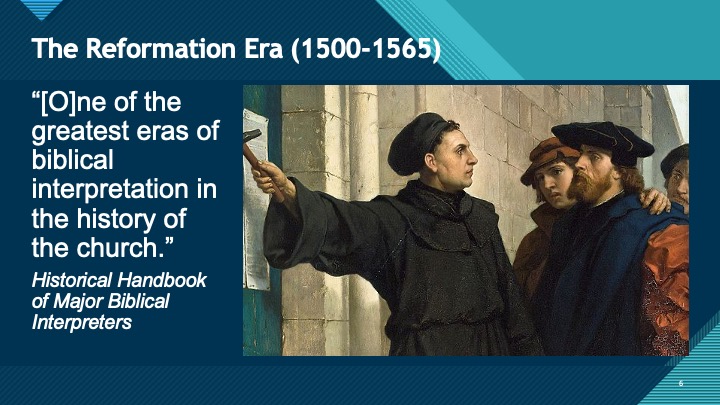
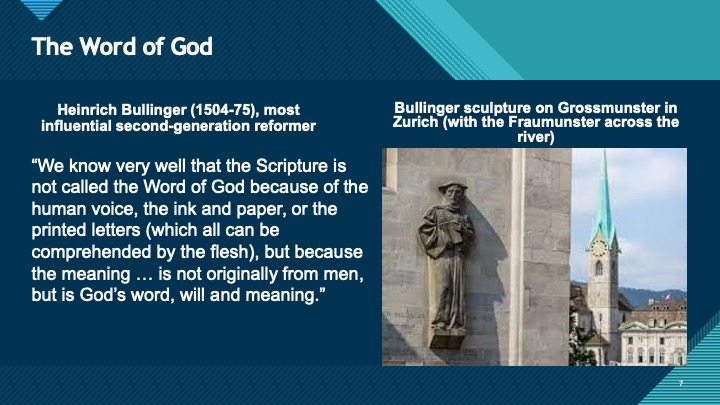
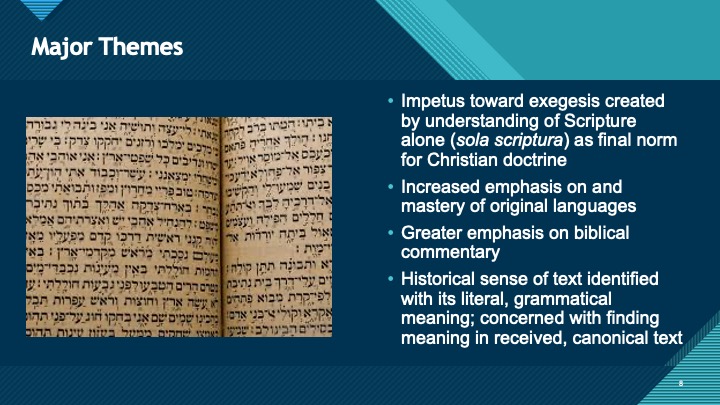
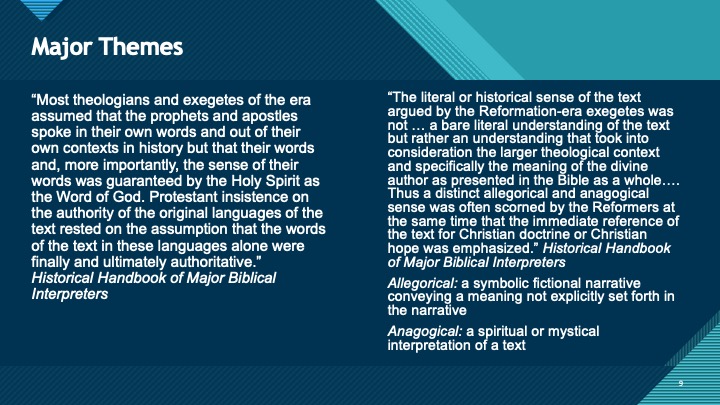
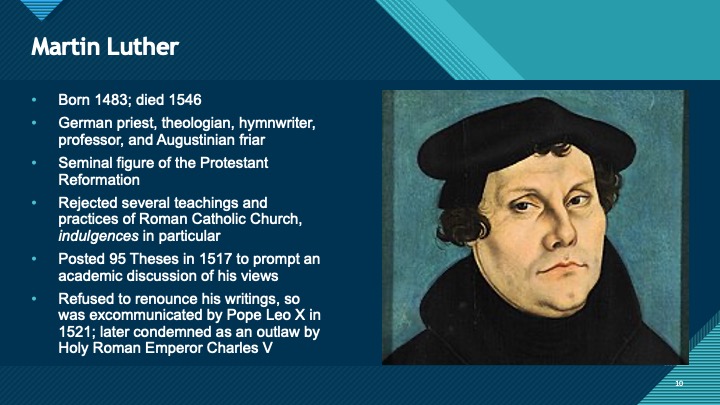
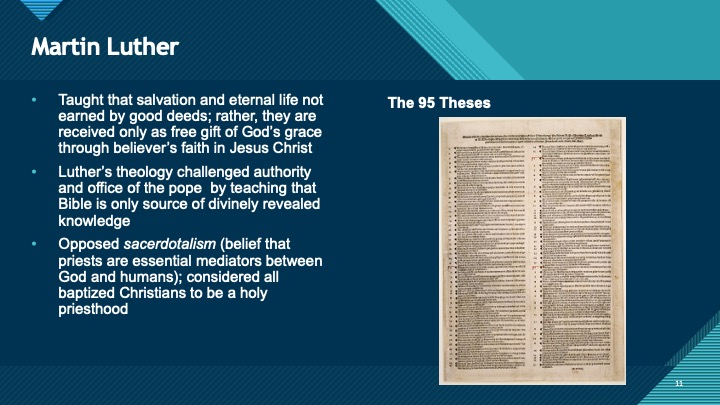
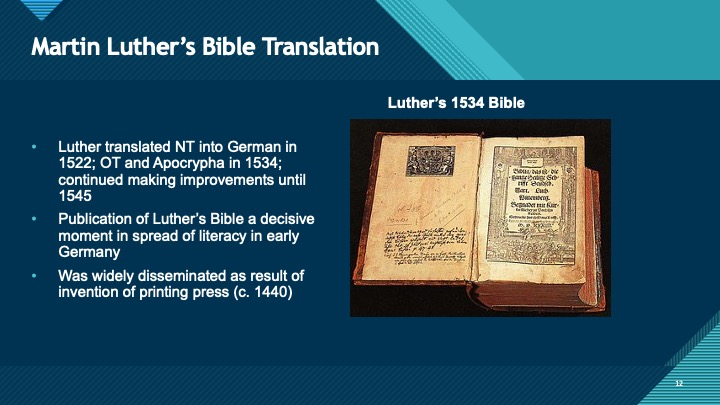
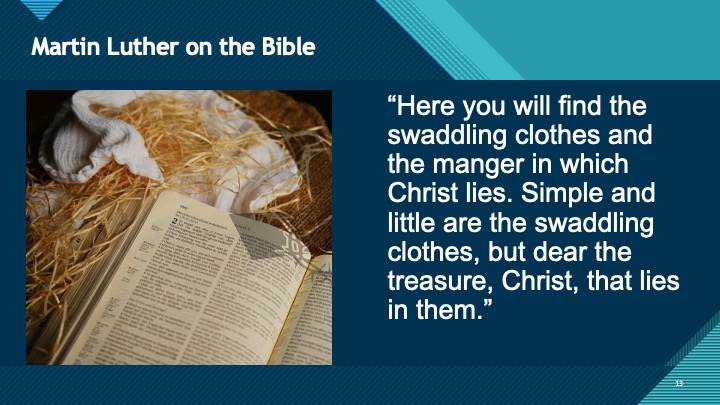
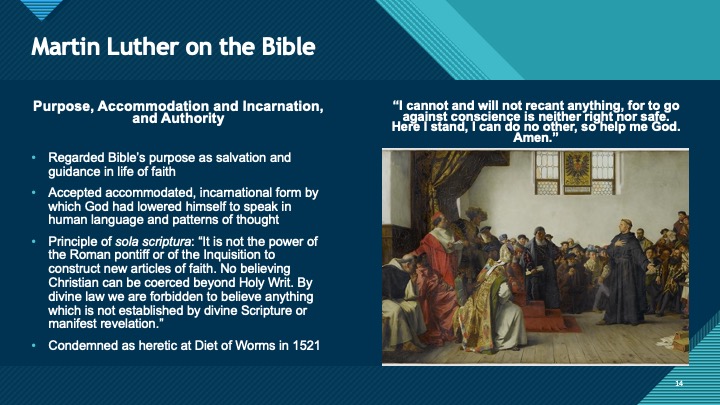
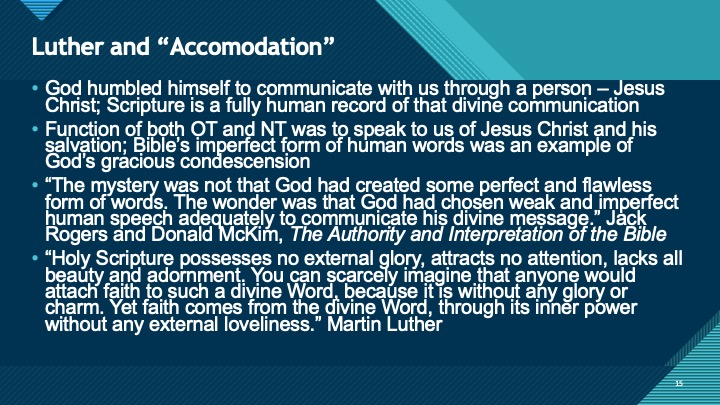
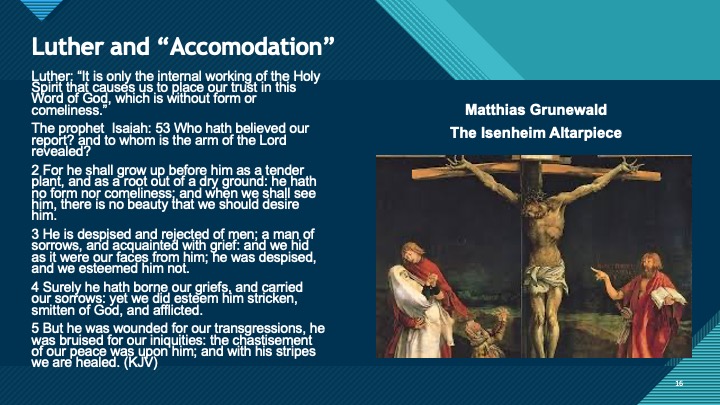
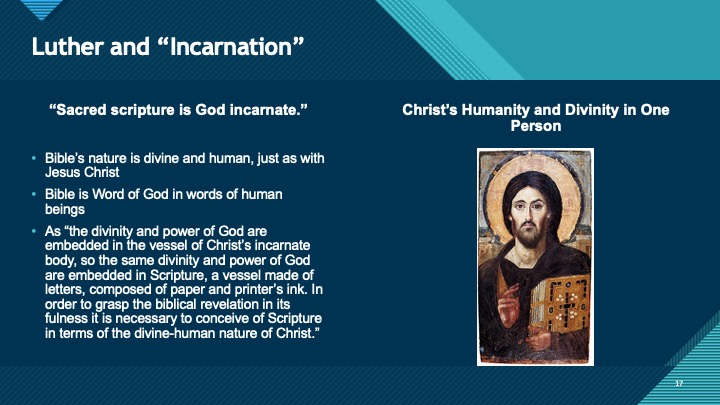
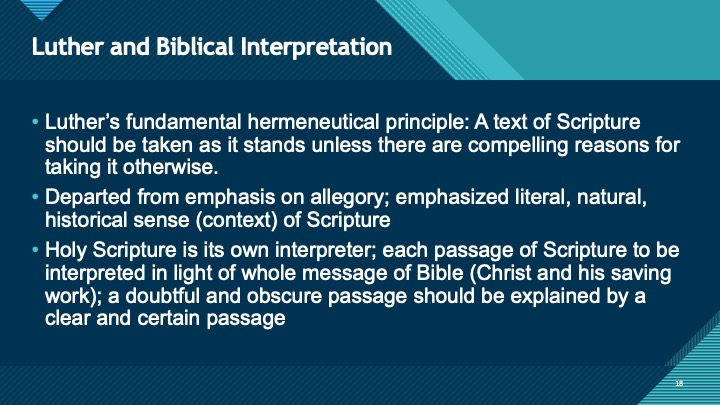
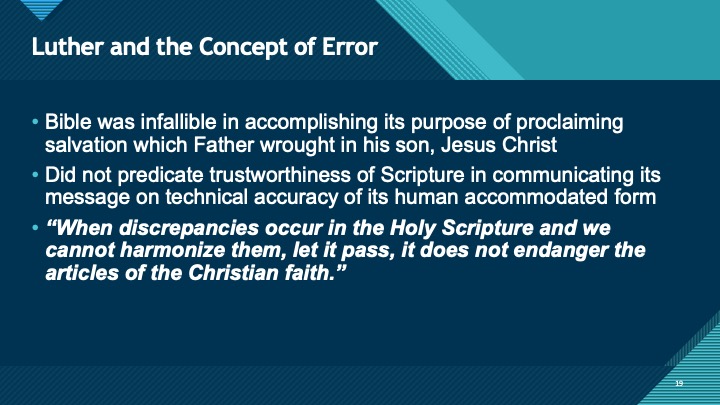
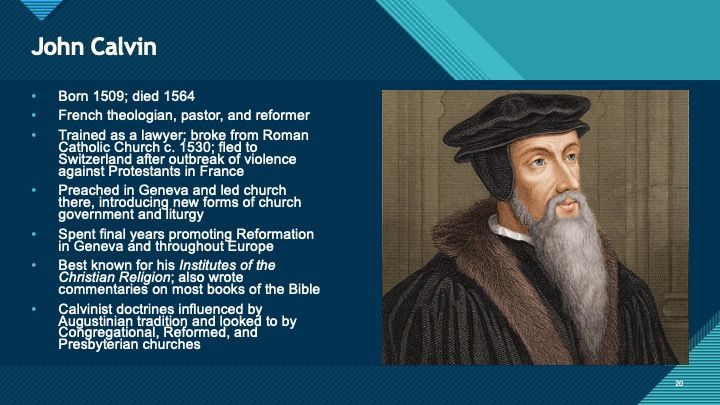
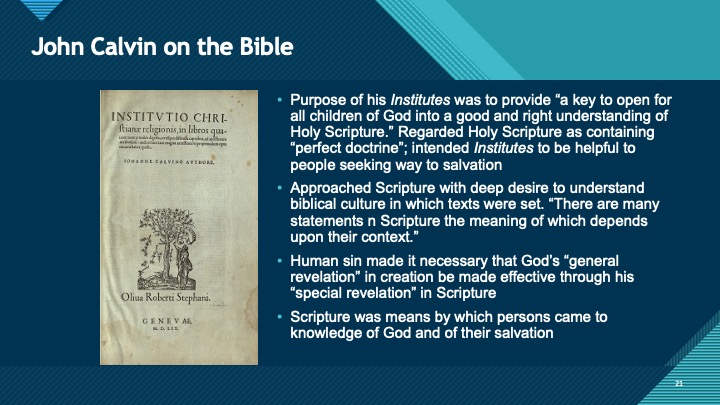
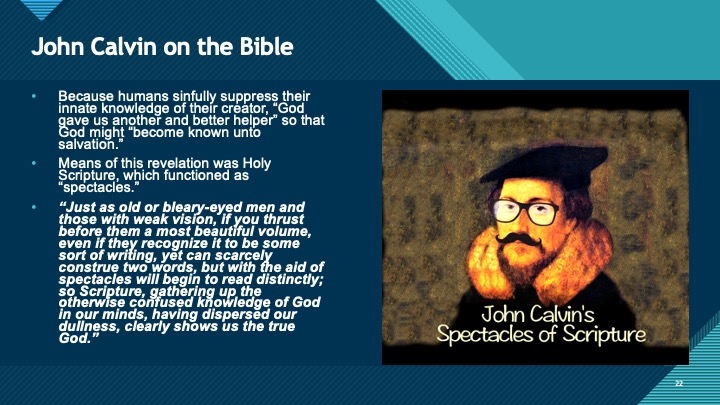
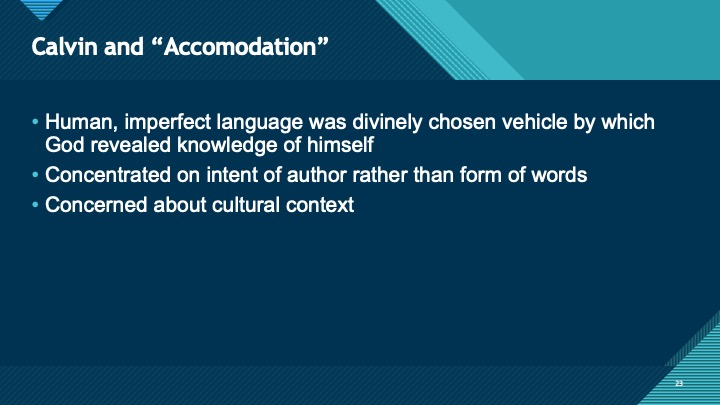
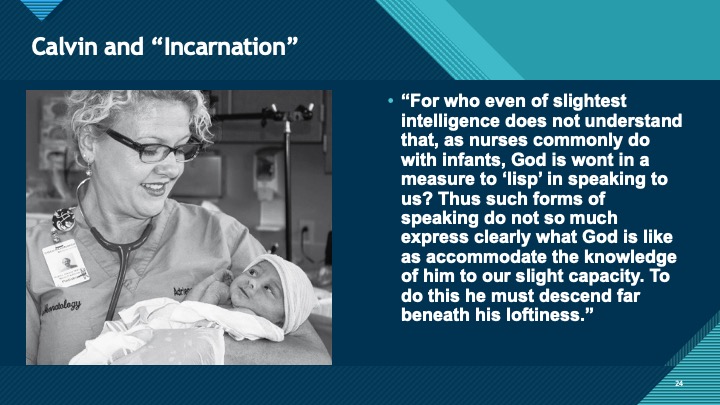
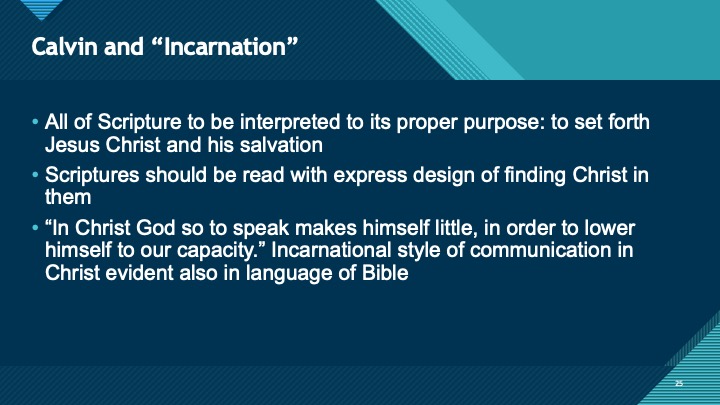
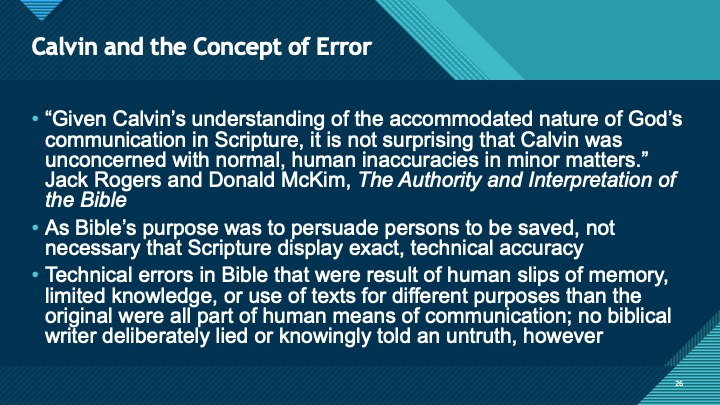
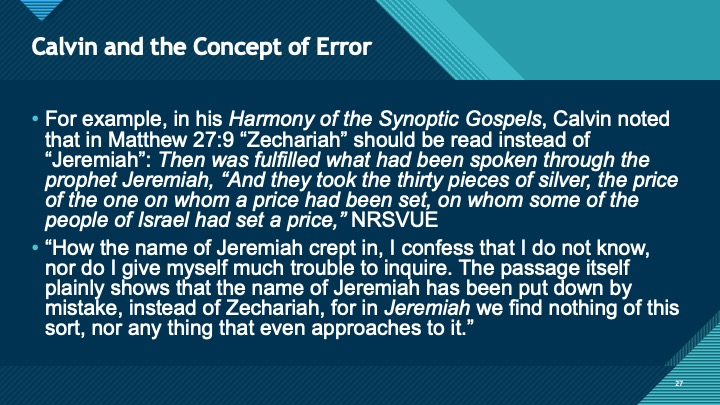
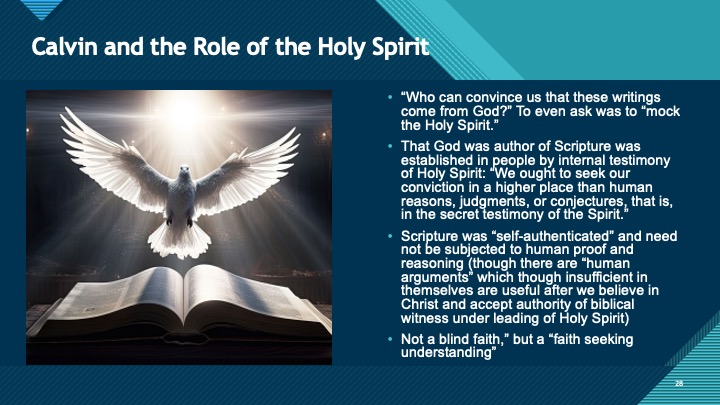
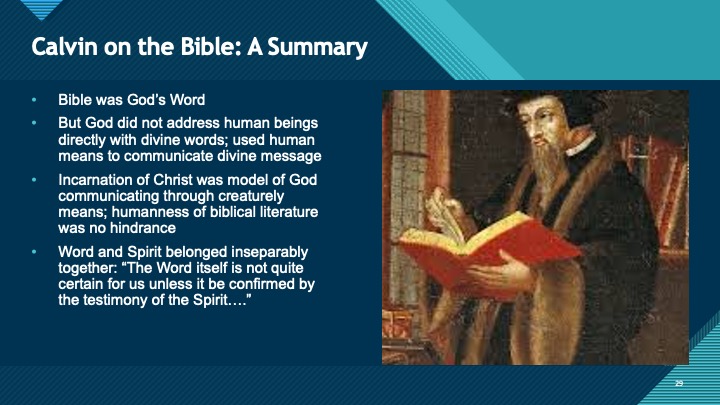
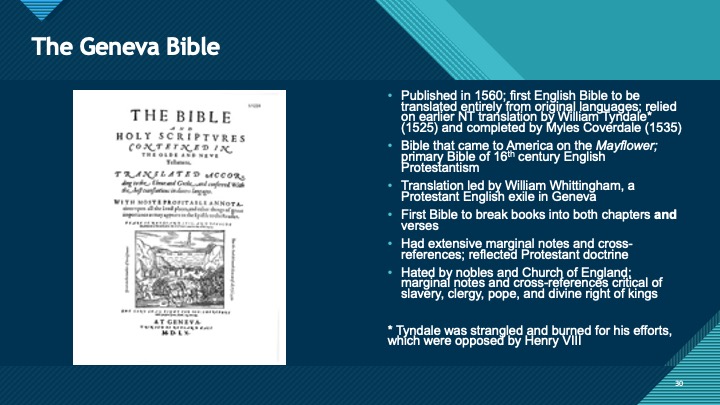
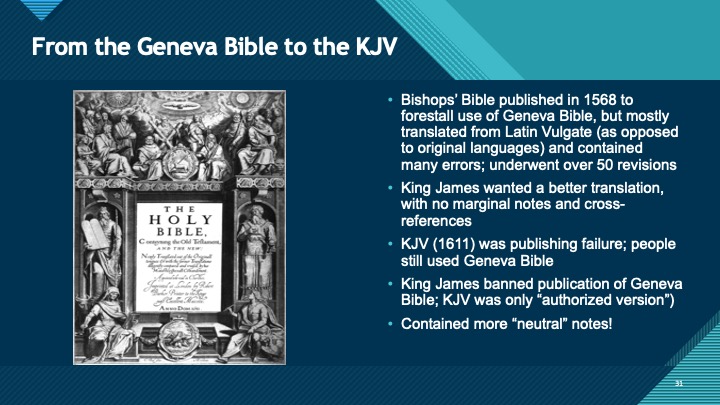
Know Your Bible Class 03
Links
< Home Page > < Top of Page >
Know Your Bible 03 Text
Know Your Bible Class 03 Text
KNOW YOUR BIBLE
WEEK THREE
The Authority and Interpretation of Scripture
The Reformers
From the inside cover of my 9th Grade Biblical Studies Curriculum
All Scripture is breathed out by God and profitable for teaching, for reproof, for correction, and for training in righteousness, that the man of God may be complete, equipped for every good work. 2 Timothy 3:16-17 (ESV)
The Bible is the cradle wherein Christ is laid. Martin Luther (more on this later)
It ain't those parts of the Bible that I can't understand that bother me, it is the parts that I do understand. Mark Twain
[T]he fountainhead of all false biblical interpretation and of all heresy is invariably the isolation and the absolutizing of one single passage. Oscar Cullmann, Lutheran Theologian
The Bible is given to us not to provide a list of rules for behavior but to reveal God’s plans and purposes to us, which in turn will allow us to participate with him in those plans and purposes. John Walton, Wheaton College Old Testament Scholar
John Wycliffe: “The Morningstar of the Reformation”
• Born in Yorkshire, England, c. 1330; died 1384; condemned for his “errors” in 1423; bones dug up, burned, and ashes tossed into river in 1428
• Theology professor at Oxford; banished in 1381 for criticism of abuses of church power and conduct of clergy; insisted that clergy be stripped of material, worldly privileges to restore them to proper spiritual life and work
• Went on to attack Roman Catholic doctrine, as would Luther and Calvin (e.g., Christ was the true head of the church, not the pope)
• “Wycliffe’s greatest contribution to church history was his elevation of the Bible to its supreme place and his insistence that it be made available to all Christians in their own language.” John Wycliffe, C.S Lewis Institute
John Wycliffe on the Bible
• “Holy Scripture is the preeminent authority for every Christian, and the rule of faith and of all human perfection.”
• “Forasmuch as the Bible contains Christ, that is all that is necessary for salvation….”
• 5 rules for studying the Bible: “Obtain a reliable text, understand the logic of Scripture, compare the parts of Scripture with one another, maintain an attitude of humble seeking, and receive the instruction of the Spirit.”
• Along with fellow scholars, translated entire Bible from Latin Vulgate to Middle English dialect; Catholic leaders viewed this as throwing “the pearl of the gospel … before swine”!
The Reformation Era (1500-1565)
“[O]ne of the greatest eras of biblical interpretation in the history of the church.”
Historical Handbook of Major Biblical Interpreters
The Word of God
Heinrich Bullinger (1504-75), most influential second-generation reformer
“We know very well that the Scripture is not called the Word of God because of the human voice, the ink and paper, or the printed letters (which all can be comprehended by the flesh), but because the meaning … is not originally from men, but is God’s word, will and meaning.”
Bullinger sculpture on Grossmunster in Zurich (with the Fraumunster across the river)
Major Themes
• Impetus toward exegesis created by understanding of Scripture alone (sola scriptura) as final norm for Christian doctrine
• Increased emphasis on and mastery of original languages
• Greater emphasis on biblical commentary
• Historical sense of text identified with its literal, grammatical meaning; concerned with finding meaning in received, canonical text
• “Most theologians and exegetes of the era assumed that the prophets and apostles spoke in their own words and out of their own contexts in history but that their words and, more importantly, the sense of their words was guaranteed by the Holy Spirit as the Word of God. Protestant insistence on the authority of the original languages of the text rested on the assumption that the words of the text in these languages alone were finally and ultimately authoritative.” Historical Handbook of Major Biblical Interpreters
• “The literal or historical sense of the text argued by the Reformation-era exegetes was not … a bare literal understanding of the text but rather an understanding that took into consideration the larger theological context and specifically the meaning of the divine author as presented in the Bible as a whole…. Thus a distinct allegorical and anagogical sense was often scorned by the Reformers at the same time that the immediate reference of the text for Christian doctrine or Christian hope was emphasized.” Historical Handbook of Major Biblical Interpreters
• Allegorical: a symbolic fictional narrative conveying a meaning not explicitly set forth in the narrative
• Anagogical: a spiritual or mystical interpretation of a text
Martin Luther
• Born 1483; died 1546
• German priest, theologian, hymnwriter, professor, and Augustinian friar
• Seminal figure of the Protestant Reformation
• Rejected several teachings and practices of Roman Catholic Church, indulgences in particular
• Posted 95 Theses in 1517 to prompt an academic discussion of his views
• Refused to renounce his writings, so was excommunicated by Pope Leo X in 1521; later condemned as an outlaw by Holy Roman Emperor Charles V
• Taught that salvation and eternal life not earned by good deeds; rather, they are received only as free gift of God’s grace through believer’s faith in Jesus Christ
• Luther’s theology challenged authority and office of the pope by teaching that Bible is only source of divinely revealed knowledge
• Opposed sacerdotalism (belief that priests are essential mediators between God and humans); considered all baptized Christians to be a holy priesthood
Martin Luther’s Bible Translation
• Luther translated NT into German in 1522; OT and Apocrypha in 1534; continued making improvements until 1545
• Publication of Luther’s Bible a decisive moment in spread of literacy in early Germany
• Was widely disseminated as result of invention of printing press (c. 1440)
Martin Luther on the Bible
“Here you will find the swaddling clothes and the manger in which Christ lies. Simple and little are the swaddling clothes, but dear the treasure, Christ, that lies in them.”
Martin Luther on the Bible
Purpose, Accommodation and Incarnation, and Authority
• Regarded Bible’s purpose as salvation and guidance in life of faith
• Accepted accommodated, incarnational form by which God had lowered himself to speak in human language and patterns of thought
• Principle of sola scriptura: “It is not the power of the Roman pontiff or of the Inquisition to construct new articles of faith. No believing Christian can be coerced beyond Holy Writ. By divine law we are forbidden to believe anything which is not established by divine Scripture or manifest revelation.”
• Condemned as heretic at Diet of Worms in 1521
• “I cannot and will not recant anything, for to go against conscience is neither right nor safe. Here I stand, I can do no other, so help me God. Amen.”
Luther and “Accommodation”
• God humbled himself to communicate with us through a person – Jesus Christ; Scripture is a fully human record of that divine communication
• Function of both OT and NT was to speak to us of Jesus Christ and his salvation; Bible’s imperfect form of human words was an example of God’s gracious condescension
• “The mystery was not that God had created some perfect and flawless form of words. The wonder was that God had chosen weak and imperfect human speech adequately to communicate his divine message.” Jack Rogers and Donald McKim, The Authority and Interpretation of the Bible
• “Holy Scripture possesses no external glory, attracts no attention, lacks all beauty and adornment. You can scarcely imagine that anyone would attach faith to such a divine Word, because it is without any glory or charm. Yet faith comes from the divine Word, through its inner power without any external loveliness.” Martin Luther
• Luther: “It is only the internal working of the Holy Spirit that causes us to place our trust in this Word of God, which is without form or comeliness.”
• The prophet Isaiah: 53 Who hath believed our report? and to whom is the arm of the Lord revealed?
• 2 For he shall grow up before him as a tender plant, and as a root out of a dry ground: he hath no form nor comeliness; and when we shall see him, there is no beauty that we should desire him.
• 3 He is despised and rejected of men; a man of sorrows, and acquainted with grief: and we hid as it were our faces from him; he was despised, and we esteemed him not.
• 4 Surely he hath borne our griefs, and carried our sorrows: yet we did esteem him stricken, smitten of God, and afflicted.
• 5 But he was wounded for our transgressions, he was bruised for our iniquities: the chastisement of our peace was upon him; and with his stripes we are healed. (KJV)
Luther and “Incarnation”
“Sacred scripture is God incarnate.”
• Bible’s nature is divine and human, just as with Jesus Christ
• Bible is Word of God in words of human beings
• As “the divinity and power of God are embedded in the vessel of Christ’s incarnate body, so the same divinity and power of God are embedded in Scripture, a vessel made of letters, composed of paper and printer’s ink. In order to grasp the biblical revelation in its fulness it is necessary to conceive of Scripture in terms of the divine-human nature of Christ.”
Luther and Biblical Interpretation
• Luther’s fundamental hermeneutical principle: A text of Scripture should be taken as it stands unless there are compelling reasons for taking it otherwise.
• Departed from emphasis on allegory; emphasized literal, natural, historical sense (context) of Scripture
• Holy Scripture is its own interpreter; each passage of Scripture to be interpreted in light of whole message of Bible (Christ and his saving work); a doubtful and obscure passage should be explained by a clear and certain passage
Luther and the Concept of Error
• Bible was infallible in accomplishing its purpose of proclaiming salvation which Father wrought in his son, Jesus Christ
• Did not predicate trustworthiness of Scripture in communicating its message on technical accuracy of its human accommodated form
• “When discrepancies occur in the Holy Scripture and we cannot harmonize them, let it pass, it does not endanger the articles of the Christian faith.”
John Calvin
• Born 1509; died 1564
• French theologian, pastor, and reformer
• Trained as a lawyer; broke from Roman Catholic Church c. 1530; fled to Switzerland after outbreak of violence against Protestants in France
• Preached in Geneva and led church there, introducing new forms of church government and liturgy
• Spent final years promoting Reformation in Geneva and throughout Europe
• Best known for his Institutes of the Christian Religion; also wrote commentaries on most books of the Bible
• Calvinist doctrines influenced by Augustinian tradition and looked to by Congregational, Reformed, and Presbyterian churches
John Calvin on the Bible
• Purpose of his Institutes was to provide “a key to open for all children of God into a good and right understanding of Holy Scripture.” Regarded Holy Scripture as containing “perfect doctrine”; intended Institutes to be helpful to people seeking way to salvation
• Approached Scripture with deep desire to understand biblical culture in which texts were set. “There are many statements in Scripture the meaning of which depends upon their context.”
• Human sin made it necessary that God’s “general revelation” in creation be made effective through his “special revelation” in Scripture
• Scripture was means by which persons came to knowledge of God and of their salvation
• Because humans sinfully suppress their innate knowledge of their creator, “God gave us another and better helper” so that God might “become known unto salvation.”
• Means of this revelation was Holy Scripture, which functioned as “spectacles.”
• “Just as old or bleary-eyed men and those with weak vision, if you thrust before them a most beautiful volume, even if they recognize it to be some sort of writing, yet can scarcely construe two words, but with the aid of spectacles will begin to read distinctly; so Scripture, gathering up the otherwise confused knowledge of God in our minds, having dispersed our dullness, clearly shows us the true God.”
Calvin and “Accommodation”
• Human, imperfect language was divinely chosen vehicle by which God revealed knowledge of himself
• Concentrated on intent of author rather than form of words
• Concerned about cultural context
Calvin and “Incarnation”
• “For who even of slightest intelligence does not understand that, as nurses commonly do with infants, God is wont in a measure to ‘lisp’ in speaking to us? Thus such forms of speaking do not so much express clearly what God is like as accommodate the knowledge of him to our slight capacity. To do this he must descend far beneath his loftiness.”
• All of Scripture to be interpreted to its proper purpose: to set forth Jesus Christ and his salvation
• Scriptures should be read with express design of finding Christ in them
• “In Christ God so to speak makes himself little, in order to lower himself to our capacity.” Incarnational style of communication in Christ evident also in language of Bible
Calvin and the Concept of Error
• “Given Calvin’s understanding of the accommodated nature of God’s communication in Scripture, it is not surprising that Calvin was unconcerned with normal, human inaccuracies in minor matters.” Jack Rogers and Donald McKim, The Authority and Interpretation of the Bible
• As Bible’s purpose was to persuade persons to be saved, not necessary that Scripture display exact, technical accuracy
• Technical errors in Bible that were result of human slips of memory, limited knowledge, or use of texts for different purposes than the original were all part of human means of communication; no biblical writer deliberately lied or knowingly told an untruth, however
• For example, in his Harmony of the Synoptic Gospels, Calvin noted that in Matthew 27:9 “Zechariah” should be read instead of “Jeremiah”: Then was fulfilled what had been spoken through the prophet Jeremiah, “And they took the thirty pieces of silver, the price of the one on whom a price had been set, on whom some of the people of Israel had set a price,” NRSVUE
• “How the name of Jeremiah crept in, I confess that I do not know, nor do I give myself much trouble to inquire. The passage itself plainly shows that the name of Jeremiah has been put down by mistake, instead of Zechariah, for in Jeremiah we find nothing of this sort, nor any thing that even approaches to it.”
Calvin and the Role of the Holy Spirit
• “Who can convince us that these writings come from God?” To even ask was to “mock the Holy Spirit.”
• That God was author of Scripture was established in people by internal testimony of Holy Spirit: “We ought to seek our conviction in a higher place than human reasons, judgments, or conjectures, that is, in the secret testimony of the Spirit.”
• Scripture was “self-authenticated” and need not be subjected to human proof and reasoning (though there are “human arguments” which though insufficient in themselves are useful after we believe in Christ and accept authority of biblical witness under leading of Holy Spirit)
• Not a blind faith,” but a “faith seeking un understanding”
Calvin on the Bible: A Summary
• Bible was God’s Word
• But God did not address human beings directly with divine words; used human means to communicate divine message
• Incarnation of Christ was model of God communicating through creaturely means; humanness of biblical literature was no hindrance
• Word and Spirit belonged inseparably together: “The Word itself is not quite certain for us unless it be confirmed by the testimony of the Spirit….”
From the Geneva Bible to the KJV
• Bishops’ Bible published in 1568 to forestall use of Geneva Bible, but mostly translated from Latin Vulgate (as opposed to original languages) and contained many errors; underwent over 50 revisions
• King James wanted a better translation, with no marginal notes and cross-references
• KJV (1611) was publishing failure; people still used Geneva Bible
• King James banned publication of Geneva Bible; KJV was only “authorized version”)
• Contained more “neutral” notes!
The Geneva Bible
• Published in 1560; first English Bible to be translated entirely from original languages; relied on earlier NT translation by William Tyndale* (1525) and completed by Myles Coverdale (1535)
• Bible that came to America on the Mayflower; primary Bible of 16th century English Protestantism
• Translation led by William Whittingham, a Protestant English exile in Geneva
• First Bible to break books into both chapters and verses
• Had extensive marginal notes and cross-references; reflected Protestant doctrine
• Hated by nobles and Church of England; marginal notes and cross-references critical of slavery, clergy, pope, and divine right of kings
* Tyndale was strangled and burned for his efforts, which were opposed by Henry VIII
KNOW YOUR BIBLE
WEEK THREE